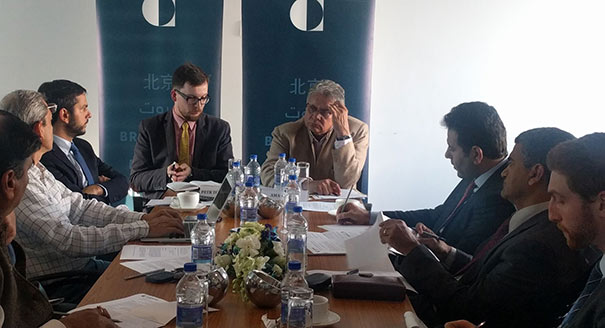Registration
Thank you!
You will receive an email confirming your registration.
Russia’s growing defense cooperation with Pakistan and contacts with the Taliban are a matter of concern for India.
Carnegie India hosted Petr Topychkanov, a fellow in the Carnegie Moscow Center’s Nonproliferation Program, for a private roundtable discussion on the motivations and goals underlying Russia’s changing policy toward the South Asian region. The discussion was chaired by Amar Sinha, former Indian ambassador to Afghanistan.
Discussion Highlights
- Contemporary Indo-Russian ties: Participants highlighted the close engagement between India and Russia over previous decades through various bilateral, trilateral, and multilateral initiatives. They emphasised that Russia is extremely invested in its relationship with India, especially in the areas of military and nuclear technology. While acknowledging that both countries have assisted each other at crucial junctures in the past, they noted that the Indo-Russian relationship suffers from excessive nostalgia in the public sphere, which sometimes impacts the government-to-government relationship. Participants said that this has also created a situation in which India and Russia have failed to grasp the recent changes in each other’s domestic politics. To bridge this gap, they called for greater dialogue between India and Russia across all levels of government and between both societies.
- Russia-Pakistan Cooperation: Participants noted that Russia’s expanding cooperation with Pakistan mainly focuses on security issues, with Russian military leadership acting as the main facilitator. However, joint military exercises, in the absence of strong political dialogue and shared understanding on the nature of terrorism, is not constructive, they said. Participants also identified Russia’s need to diversify markets for its defence industry, a consideration that India is sympathetic to, as a motivating factor in this relationship. While recognising that there has not been a dramatic change in Russian policy, participants noted that closer cooperation with Pakistan today comes at the expense of Russia’s ties with India. Some participants attributed this to the lack of inter-ministerial dialogue at higher levels in the Russian government, while others speculated about a shift in Moscow’s foreign policy calculus.
- Russian Policy in Afghanistan: Participants discussed that while Moscow has been developing contacts with the Afghan Taliban, reports of Russian aid or support cannot be confirmed without documentary or photographic evidence. They said that Moscow’s intentions for developing these contacts are to maintain open channels for dialogue with the Taliban in case of a crisis, and to have political contacts with all actors in the Afghan theatre. Participants were critical about Moscow’s concerns regarding the Afghan government’s survivability and emphasized that the international community should resist engaging with the Taliban and instead interact directly with Kabul. Discussants noted, however, that Russia is less supportive than Pakistan or China of the idea of bringing the Taliban into the Afghan political process.
- Potential External Influences: Some participants conjectured that Russia’s recent outreach to Pakistan, as well as its contacts with the Taliban, could be aimed at countering U.S. presence in the region, or could be driven by Chinese influence. Others disagreed and pointed out that despite their close relations, Russian officials have named China as one of the perceived threats that necessitate a reexamination of the intermediate-range nuclear forces treaty.
- Regional Cooperation in Afghanistan: Participants recognized that national reconciliation in Afghanistan cannot be influenced by external factors. They argued that regional cooperation is important for supporting the national process and countering terrorism, and suggested that the Shanghai Cooperation Organisation (SCO) could facilitate this through an SCO-Afghanistan contact group. Recognising that the SCO has failed to develop strategic cooperation in the region in the past, participants attributed this to the absence of consensus, among members, on the nature of the terrorist threat facing the region. They recognized that evolving such a consensus would be crucial for successful regional cooperation in counter-terrorism.
This event report was prepared by Sharanya Rajiv, program assistant at Carnegie India.
